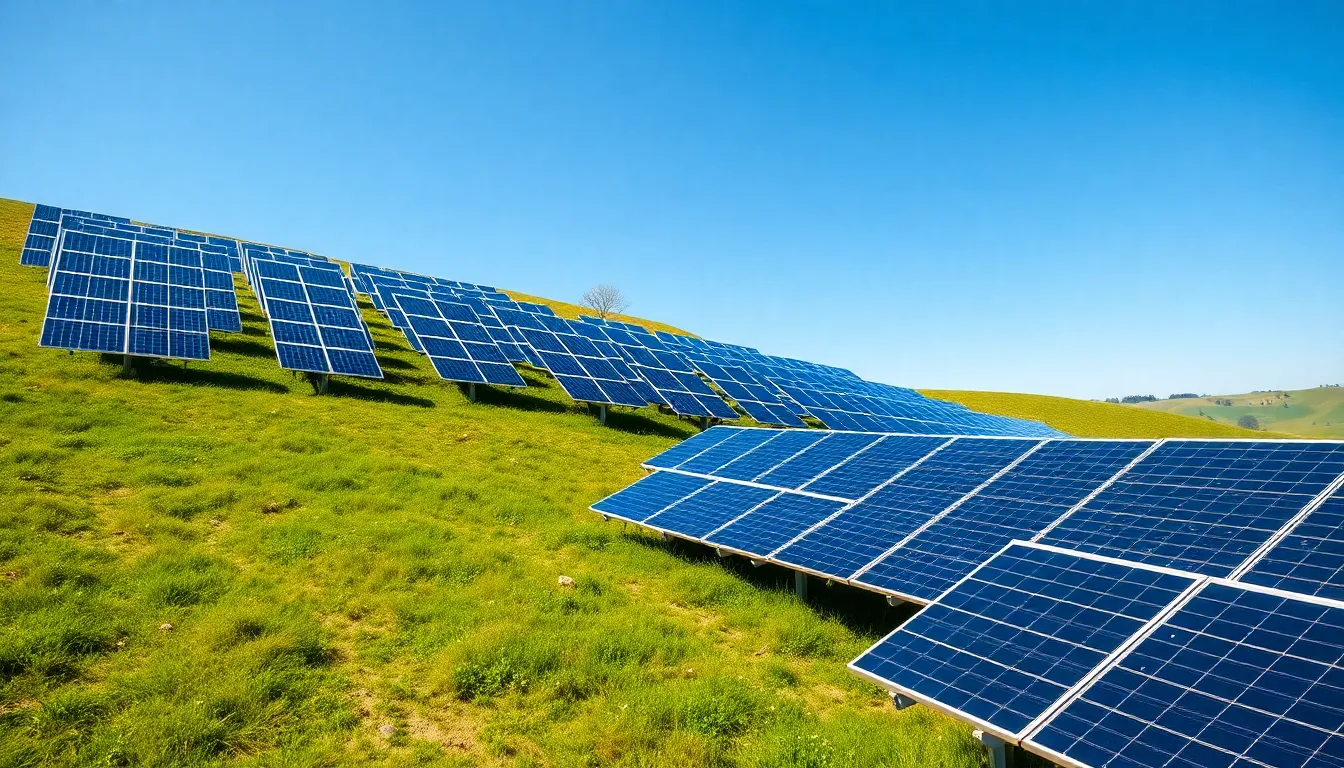Table of Contents
ToggleIn an era where environmental concerns are at the forefront, technology emerges as a powerful ally in the quest for sustainability. Innovations across various sectors are not just reshaping industries; they’re redefining how society interacts with the planet. From renewable energy solutions to smart agriculture practices, tech is paving the way for a greener future.
As businesses and individuals alike seek to reduce their carbon footprints, understanding the role of technology becomes essential. By harnessing cutting-edge advancements, they can make informed choices that promote ecological balance. This article explores the dynamic relationship between technology and sustainability, highlighting key innovations that are transforming our world for the better.
Overview of Tech for Sustainability
Tech for sustainability encompasses innovations aimed at reducing environmental impacts while enhancing resource efficiency. Various technologies contribute significantly to achieving sustainable development goals.
Renewable Energy Technologies
- Solar Power: Solar panels convert sunlight into electricity, providing clean energy without harmful emissions.
- Wind Energy: Wind turbines harness wind currents to generate power, promoting energy independence and reducing reliance on fossil fuels.
- Hydropower: Hydroelectric plants utilize the flow of water to produce energy, capitalizing on natural resources efficiently.
Smart Agriculture
- Precision Farming: Sensors and data analytics optimize crop yields while minimizing water and fertilizer usage.
- Vertical Farming: Indoor farms use advanced lighting and climate control to grow crops year-round in urban settings, reducing transportation emissions.
- Biotechnology: Genetically modified organisms (GMOs) enhance crop resilience against pests and climate change, promoting food security.
Efficient Transportation Solutions
- Electric Vehicles (EVs): EVs reduce greenhouse gas emissions and dependence on fossil fuels with sustainable battery technologies.
- Public Transport Innovations: Incorporating smart technology in public transit systems improves efficiency and encourages lower carbon footprint commuting.
- Bicycle Sharing Programs: These programs promote eco-friendly transportation alternatives, reducing congestion and pollution in urban areas.
Waste Management Technologies
- Recycling Innovations: Enhanced sorting technologies improve recycling rates, diverting waste from landfills.
- Biodegradable Materials: Development of biodegradable substitutes reduces plastic pollution, contributing to a circular economy.
- Waste-to-Energy (WtE): WtE technologies convert organic waste into energy, minimizing landfill use while generating power.
Water Conservation Technologies
- Smart Irrigation Systems: These systems use sensors and data to optimize water usage in agriculture, conserving vital resources.
- Water Filtration Innovations: Advanced filtration technologies provide clean drinking water, reducing the reliance on bottled water and plastic waste.
- Rainwater Harvesting Systems: Collecting and storing rainwater promotes sustainable water use in both residential and commercial settings.
Leveraging tech for sustainability transforms industries and encourages responsible resource usage, shaping a resilient future.
Key Technologies Driving Sustainability

Advancements in technology play a crucial role in fostering sustainability across various sectors. The following technologies are fundamental in driving sustainable practices and reducing environmental impact.
Renewable Energy Solutions
Renewable energy technologies significantly reduce greenhouse gas emissions.
- Solar Power: Solar photovoltaic systems convert sunlight into electricity, offering clean energy for residential and commercial uses.
- Wind Energy: Onshore and offshore wind turbines harness wind energy, providing sustainable electricity and reducing reliance on fossil fuels.
- Hydropower: Hydroelectric power plants generate electricity through water flow, making it a stable and renewable energy source.
- Geothermal Energy: This technology utilizes heat from the Earth’s interior for electricity generation and direct heating applications.
Smart Agriculture Tools
Smart agriculture technologies enhance efficiency and resource management in farming.
- Precision Farming: This approach leverages GPS and IoT sensors to optimize field-level management, reducing chemical use and increasing yields.
- Vertical Farming: Indoor farming techniques use controlled environments to grow crops vertically, significantly conserving land and water resources.
- Biotechnology: Genetic engineering in crops enhances resistance to pests and diseases, improving food security while minimizing chemical inputs.
Waste Management Innovations
Innovative waste management solutions minimize waste and encourage recycling.
- Recycling Innovations: Advanced sorting technologies and recycling processes boost recycling rates and reduce landfill dependency.
- Biodegradable Materials: New materials that decompose naturally reduce pollution and the environmental burden of traditional plastics.
- Waste-to-Energy Systems: These technologies convert waste into energy through thermal or biochemical processes, reducing landfill contributions while generating electricity.
Impact of Tech on Sustainable Practices
Technology significantly improves sustainability efforts across various sectors, making processes more efficient and reducing environmental harm. Innovations in efficiency and carbon footprint reduction play crucial roles in this transformation.
Efficiency Improvements
Technologies streamline operations, leading to substantial efficiency improvements. Automation tools increase productivity in manufacturing, reducing energy consume and material waste. Energy management systems optimize building operations, lowering utility costs while enhancing performance. Smart grid technologies allow real-time energy distribution, maximizing renewable energy usage.
Data analytics provide insights for optimizing resource allocation in agricultural practices. Precision farming tools help farmers apply water and nutrients in targeted amounts, minimizing excess supply. These advancements promote sustainable practices while improving yield and reducing labor costs.
Reducing Environmental Footprint
Reducing the environmental footprint remains a critical goal of technological advancements. Renewable energy systems like solar panels and wind turbines directly replace fossil fuels, cutting down greenhouse gas emissions. Electric vehicles (EVs) contribute to this shift by providing zero-emission transportation options.
Waste management technologies like anaerobic digestion transform organic waste into energy, decreasing landfill reliance. Biodegradable materials replace conventional plastics, lowering pollution levels. Green computing practices, such as energy-efficient data centers, minimize electronic waste and energy consumption.
By adopting these innovative technologies, industries can significantly lower their environmental impact and foster a sustainable future.
Challenges in Implementing Tech for Sustainability
Technological advancements face several challenges that hinder their effectiveness in promoting sustainability. Addressing these challenges is crucial for achieving a sustainable future.
Cost and Accessibility Issues
Cost remains a significant barrier to widespread adoption of sustainable technology. Many emerging technologies, like renewable energy systems and electric vehicles, often require substantial upfront investment. For small businesses and developing regions, this financial burden can prevent access to critical innovations. Additionally, accessibility plays a crucial role; areas with limited infrastructure may lack the necessary support for implementing these technologies. For instance, rural regions often face higher costs for energy delivery, making it challenging to adopt solar or wind energy solutions. Striking a balance between cost-effective solutions and accessibility is essential for advancing sustainability efforts.
Regulatory and Policy Barriers
Regulatory and policy frameworks can impede the implementation of sustainable technologies. Existing regulations may prioritize traditional energy sources over renewable ones, making it harder for innovative technologies to gain traction. Moreover, slow policy adaptation can hinder quick responses to rapid technological advancements. For example, tax incentives for renewable energy might not be available in certain regions, limiting their market competitiveness. To optimize the integration of sustainable technology, cohesive policies that support innovation and environmental goals are necessary.
Technology stands as a powerful ally in the quest for sustainability. By embracing innovative solutions across various sectors, individuals and businesses can significantly reduce their environmental impact. The advancements in renewable energy, smart agriculture, and waste management not only enhance efficiency but also promote a more sustainable way of living.
While challenges like cost and regulatory barriers exist, the potential benefits of adopting these technologies far outweigh the obstacles. A collective effort towards understanding and implementing these solutions can pave the way for a greener future. As society continues to innovate, the path to sustainability becomes clearer, encouraging everyone to contribute to a healthier planet.







